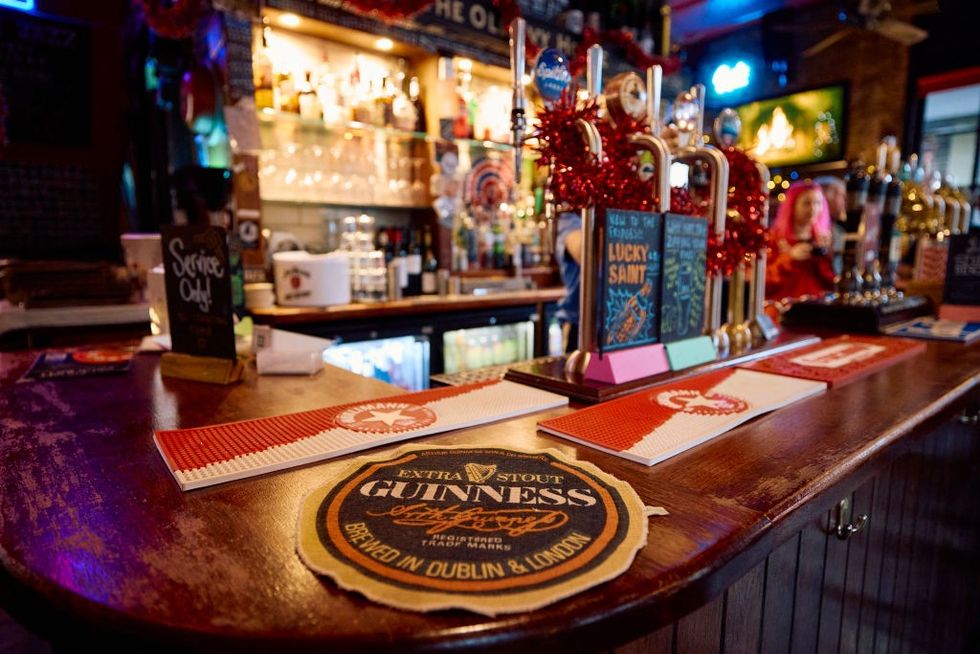At her London pub, landlady Kate Davidson has taken to issuing Guinness ration cards, but still the beer has run out amid a UK shortage of Ireland's national drink.
Bars across Britain, even Irish ones, have reported limited supplies of the black stuff since Guinness owner Diageo announced earlier this month that it was experiencing "exceptional consumer demand".
"I'm a bit shocked because it's Christmas," said Davidson, co-owner of the Old Ivy House, where an empty upside down Guinness glass signalled that its tap had run dry.
"I wouldn't have expected them to run out at this time of year," the 42-year-old told AFP at the cosy boozer in the Clerkenwell area of central London.
A number of factors have meant that Diageo has become a victim of its own success.
Earlier this year, Diageo chief executive Debra Crew said Guinness consumption was up 24 per cent among women, as the company shifts its marketing strategy to attract new consumers.
So-called ‘Guinnfluencers’ online - including Kim Kardashian, who has posted a photo of herself with the beer on Instagram - have been credited with fuelling the stout's appeal among Gen Z.

And a viral craze online where drinkers take a big gulp to try to line up the beer with the glass's Guinness logo in a challenge called ‘Split the G’ has also helped.
Diageo began restricting the number of barrels of Guinness that pubs in Britain can buy because of the soaring sales of the stout.
The dark, creamy liquid, traditionally seen as the drink of choice for rugby fans and middle aged men with beards, had soared in popularity among younger women.
Davidson first realised there was a problem when she tried to make her normal weekly order of seven or eight barrels, to be told she could only buy four.
"The brewery confirmed that they were being rationed by Diageo, so they were passing on that ration (to us)," she explained.
Davidson and her business partner came up with the idea to introduce the ration card, which requires customers to purchase two other drinks before being allowed to buy a Guinness.
It notes "these difficult times of Guinness rationing".
"It's just a bit of fun, really," said Davidson. "Nobody's turned around and walked out."
'Panic buying'
Despite the initiative, the barrels - which hold 88 pints of Guinness each - were empty by Friday night. The drink won't be back on tap until the next delivery on Wednesday.
"It's kind of sad," 39-year-old Guinness fan and tattoo artist Claudia Russo told AFP, knocking back a Bloody Mary instead.
Sales of Guinness by volume in Britain soared by almost 21 per cent between July and October, despite the overall beer market gradually declining, according to food and drink market research brand CGA by NIQ.
"Over the past month we have seen exceptional consumer demand for Guinness in Great Britain," a Diageo spokesperson said in a statement sent to AFP.
"We have maximised supply and we are working proactively with our customers to manage the distribution to trade as efficiently as possible."
Shaun Jenkinson, operations director for the Katie O'Brien's chain of Irish pubs, said they had been receiving "about 70 per cent of the stock required to fulfil orders at present".
He told AFP via email that he has received "continued warnings from wholesalers that they are not expecting to be able to meet our requirements in the run up to Christmas".
The Times reported this month that the shortage was encouraging "panic buying" - worsening supplies.
"Stop young people drinking Guinness and there won't be this problem," 79-year-old author Howard Thomas told AFP at the Old Ivy House.
"Keep it for the old people."
(AFP)






